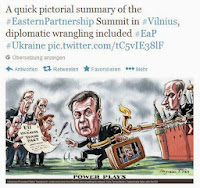 | |
|
Many European diplomats expressed their disappointment that Ukraine put the European integration on hold which could be seen as far from achieving the principles of democracy and the rule of law.
The Eastern Partnership (EaP) was initiated by Poland and subsequently supported by Sweden in 2008. The Initiative was launched in 2009 and adressed to six countries in Eastern Europe: Armenia, Azerbaijan, Belarus, Georgia, Moldova and Ukraine. The disappointment from Poland and Sweden might be regarded at first sight as obvious; in particualr since the Ukrainian government put the signing of an Association Agreemnet with the EU on hold.
Polish and Swedish "Twitter Diplomats"
 |
| Foto @carlbildt/Twitter |
Swedish Foreign Minister Carl Bildt expressed his disappointment and stated that "Ukraine is sending negative signal" to all partners in the world on its "willingness to reform and develop its economy". He made it clearly that Sweden's attitude towards Ukraine is quite negative and he expects reforms in order to precede the integration process with the European Union.
 |
| Foto @sikorskiradek/Twitter |
Polish Foreign Minister Radoslav Sikorski is quite positive in his statement with regard to Ukraine's "final decision on AA (Association Agreement)". He putted his optimism that "Ukraine's Security Council and President (Viktor) Yanukovych" will wisely decide for the Ukrainian people. Mr. Sikorski made his statement quite positive since he is addressing personally President Yanukovych to re-choose his decision in order to help the Ukrainian people. However, in my opinion it seems as Radoslav Sikorski is addressing Belarusian President Alexander Lukashenko since he is talking about the people of Ukraine.
Lithuania and Stefan Füle
 |
| Foto @LinkeviciusL/Twitter |
Lithuanian Foreign Minister Linas Linkevicius whose country is heading the Presidency of the Council of the European Union made it clear that, on the one side, he expects responsibility and readiness from President Yanukovych. On the other side, Mr. Linkevicius strongly opposes a "proposal for the trilateral dialogue" between the EU, Russia and Ukraine. He goes further and opens the door for Ukraine: "EU proposal for bilateral association remains on the table and we see no role for third countries in this process."
 |
| Foto @StefanFuleEU/Twitter |
Stefan Füle, Commissioner for Enlargement and Neighbourhood Policy, responded very directly to Ukraine's decision and blamed Russia's impact and influence on Ukraine with regard to "recent unjustified economic and trade measures against Kyiv". He addressed Russia as the main political string-pulling actor and supporter of President Viktor Yanukovych.
"Open Door Policy"
 |
| Foto @AuswaertigesAmt/Twitter |
Nevertheless, the four diplomats remain quite positive and propose an "Open Door Policy" for Ukraine. In particular, in addition and complementary to the statements given by the four diplomats in the context of the common policy towards Ukraine pursued under the Eastern Partnership policy, German Foreign Minister Guido Westerwelle stated on November 21: "The ball is in Kiev's court. It is their sovereign right to decide on their path freely." "Our interest in good relations with Ukraine is unbroken and our offer of a real partnership still stands," Westerwelle said after President Viktor Yanukovich's government decided to suspend association with the EU and renew dialogue with Russia.

Keine Kommentare:
Kommentar veröffentlichen